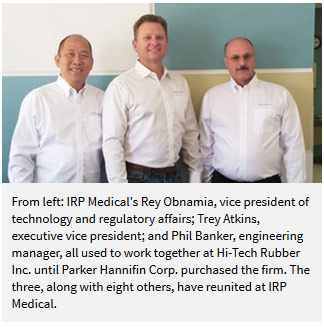Eleven former Hi-Tech Rubber employees reunite at IRP Medical
8/17/2015
By Jennifer Karpus-Romain (Rubber and Plastics News)
SAN CLEMENTE, Calif.—Getting the gang back together again is something people may discuss often, but it doesn't come to fruition. However, at IRP Medical, that became a reality.
Eleven former Hi-Tech Rubber Inc. employees are now working together again at IRP Medical, a subsidiary of International Rubber Products.
In 2008, Parker Hannifin Corp. purchased all the shares of HTR Holding Corp., which included its subsidiaries: Hi-Tech Rubber, Inland Technologies Inc., Ventrex Inc. and Accusil Inc. After the acquisition, several members of the senior leadership team, including key technical, customer service, quality and engineering, left the company for other rubber and silicone manufacturing companies, according to Trey Atkins, executive vice president of IRP Medical.
Rey Obnamia, vice president of technology and regulatory affairs at IRP Medical, said when Parker came in, it implemented its own way of managing the business, which was different than how Hi-Tech was handled.
The late Bill Sherman, who was president and chief operating officer of the Hi-Tech Group companies, had introduced Atkins to Rod Trujillo, CEO of IRP, in 2009. At the time, Atkins had been working as vice president of operations for Innovative Surgical Products, a division of Tustin, Calif.-based Specialty Silicone Fabricators Inc. Atkins later went on to work for Vesta, but when IRP purchased the current IRP Medical facility housed in San Clemente, he decided to join the team.
Atkins said some Hi-Tech alum were already on board when he signed on, including Danny Gomez, operations manager, and Ray Rozelle, facilities manager. Phil Banker, engineering manager, was hired around the same time as Atkins. Obnamia joined in July 2014. Besides these five key players, six others from Hi-Tech currently work for IRP Medical: one QA inspector, one molding/setup technician and four machine operators.
“It is a rarity to get a team together again. We felt we were really successful at Hi-Tech Rubber and the Hi-Tech Group companies,” Atkins said.
“We all worked really well together there, and we felt we did a great job of customer service and doing the hard liquid molding jobs there at Hi-Tech. We had all gone to different companies and for one reason or another, whether it's new opportunity, more responsibility, layoffs, just a happenstance, the timing was right for a lot of us.”
In total, the IRP Medical division has about 50 employees, accounting for half of IRP's work force.
California based
Initially, the medical division of IRP was branded in 2010, Atkins said. In 2012, IRP bought the San Clemente facility and also acquired Abba Roller in Ontario, Calif.
IRP Medical resides in the San Clemente facility and is dedicated to the medical and aerospace industries, such as silicone manufacturing and organic molding related to health care.
IRP formerly was in Rancho Dominquez, Calif., but in April 2013, it divided parts of the company into the San Clemente and Ontario facilities.
IRP Medical and IRP Group Holdings operate out of the San Clemente location. The Holdings Group is the corporate entity, Atkins said, so finance, human resources and purchasing are at the location. Additionally, IRP's Abba Roller and Mikron Rubber divisions are housed together in Ontario.
IRP is a privately held company, with Trujillo and Casper Zublin, president, as the two major shareholders of the organization.
The San Clemente facility is 40,000 square feet and contains three clean rooms. The main liquid injection molding room, 8,200 square feet, is an ISO 8. The second clean room, 2,600 square feet, is where the company manufactures its compression transfer and flash-less molding tooling technology types, Atkins said. It was created as a white room. The company does have a third clean room on the second floor of the building, which is ISO 7 and spans 12,800 square feet.
The firm is running three shifts, five days per week for both its LIM and compression operations and is not using the third clean room at this time.
Specialty focus
IRP Medical specializes in silicone molding using liquid silicone and in any organic compounds related to health care.
This can range from low volume prototype development through medium to high volume needs, Atkins said. The company does not do any latex or natural rubber compounds because of the health care concerns with them.
For silicone materials, IRP Medical has the capability to work with LIM, LSR, HCR (gum), flurosilicones, and elastomers and conductive materials. In the organic and synthetic rubber materials realm, the company works both with polyisoprenes and all organic rubber compounds.
Overall, Atkins reported the firm is about 75 percent concentrated on medical devices, with 20 percent of its business in aerospace and 5 percent in miscellaneous silicone-related products.
“I think we have a broad process offering from the molding perspective because we process not only silicones, but organics and synthetics or isoprenes,” Atkins said.
“We do the majority of the molding types.”
IRP Medical participates in various medical markets, including IV disposable components, market segmentation and medical, seals, connectors, respiratory valves, diabetes components for pumps and insulin contact. The company is not necessarily locking itself into a sub-market within the medical space, Atkins said. It has a wide range of silicone capabilities and will look at most every medical application.
“We tend to gravitate a little more toward the medium to higher volume,” he said. The company usually works in the volume of hundreds of thousands of parts per year to the millions of parts per year. It also runs from semi-automatic to fully-automatic in terms of mold extraction in relation to the liquid silicone molding.
“But we have the scalability,” he added. “I think that's really the key value proposition.”
IRP Medical understands how to work with all different kinds of companies, Atkins said, ranging from a medical device incubator company or a medical startup business to a Tier II firm or a direct big original equipment manufacturer relationship. It can provide anything from low to high volume production.
“I think it gives us a very strong position to be very competitive,” Obnamia said.
Members of the Hi-Tech team on board provide expertise within IRP Medical, he said.
Growth plans
“I think the wealth of knowledge and understanding of how we grew the business back then in Anaheim (at Hi-Tech) ... really lends itself to a very, almost like a fast track on what's going on right now with us around here,” Obnamia said.
“We have seen great momentum probably in the last 10-12 months. ... It's just taking off.”
The Hi-Tech name still resonates with a customer base in the industry, and the company is looking to continue to grow and expand.
There has been a lot of good will from past relationships, Atkins said, along with IRP Medical's current supply base. In 2014, the division produced 35 prototypes and production tools. Currently, Atkins said he is building or validating 20 projects, at some level.
“We just have a lot of synergy going on,” he said.
“We also differentiate ourselves that with our past knowledge, we can look at jobs a little bit more objectively. And we try to marry the process or the tooling technology with the customer's desired output, such as quality or price.”
IRP Medical has budgeted for 12 percent growth. Atkins said it is outpacing that projection so far and thinks it will fall closer to 20 percent by the end of the year.
From a machine capacity, IRP Medical is negotiating to purchase its next liquid injection molding machine, which would bring the company up to six liquid molding machines, with a robot for part extraction.
Atkins said IRP Medical is customer-focused, and its experience helps it understand the needs of the customer. He said if the firm performs well, the customer will return.
View website


